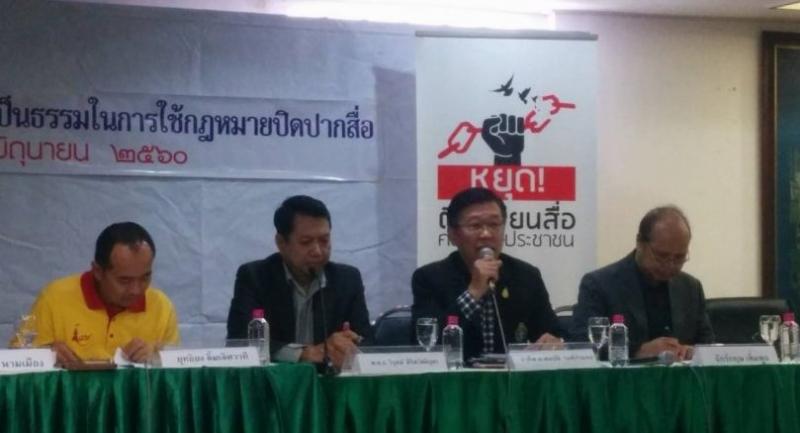Journalists warn of repression due to draconian law on online crime

JOURNALISTS in Thailand have been subjected to injustice and unfair prosecutions due to unclear laws and interdependence among officials, a seminar was told yesterday.
Legal and media workers came together for the event to discuss threats against journalists.
Natchapakorn Nammuang, an advocate from the Internet Law Reform Dialogue, said the computer crime bill was a prime example. While the criminal bill was originally designed to cope with online phishing and scams, the legislation was instead widely used together the defamation law to suppress the media.
The bill’s frequently used stipulations lie in the first paragraph of Article 14, which states that anyone involving with an import of “forged computer data” in a manner likely to cause damage to a third party or the public could be |punished with up to five years in jail, a fine of Bt 100,000, |or both.
Since the law was first enacted in 2007, online media outlets ThaiPublica and Phuketwan have been sued for allegedly violating the bill after they published news reports on their platforms. In Phuketwan’s case, the outlet merely published an article originally written by a foreign wire service, which itself was not sued.
The new version of the bill, enacted in January, changed the term in the article to “forged computer data” from “|distorted computer data”. Natchapakorn noted the change, however, was unlikely to change the atmosphere of |suppression.
One instance is that of journalist Pratch Rujivanarom, a reporter at The Nation. In March, he was sued for allegedly violating the new bill and defamation law after publishing an environmental report on a Thai mining company operating in Dawei.
While the law’s vagueness benefits law enforcement, which can interpret it broadly, checks and balances in the judicial process also played a key role in how the laws were enforced, said Pol Colonel Wirut Sirisawadibut.
Wirut, a former adviser of the police reform committee of the now-defunct National Reform Council, said that police have been empowered to file charges against suspects.
He suggested that policing authorities should be more compartmentalised. For instance, investigating officers should be separate from their offices in order to create more integrity in the judicial process, he said, adding that connections among arms of law enforcement could cause them to become partisan.
“For instance, police and prosecutors depend on each other, causing many cases to be brought through the legal process too swiftly,” he said. “Prosecutors, in fact, should have decent consideration to decide which cases should be brought to court and which should not,” he said in the discussion panel hosted by the Thai Journalists Association.
